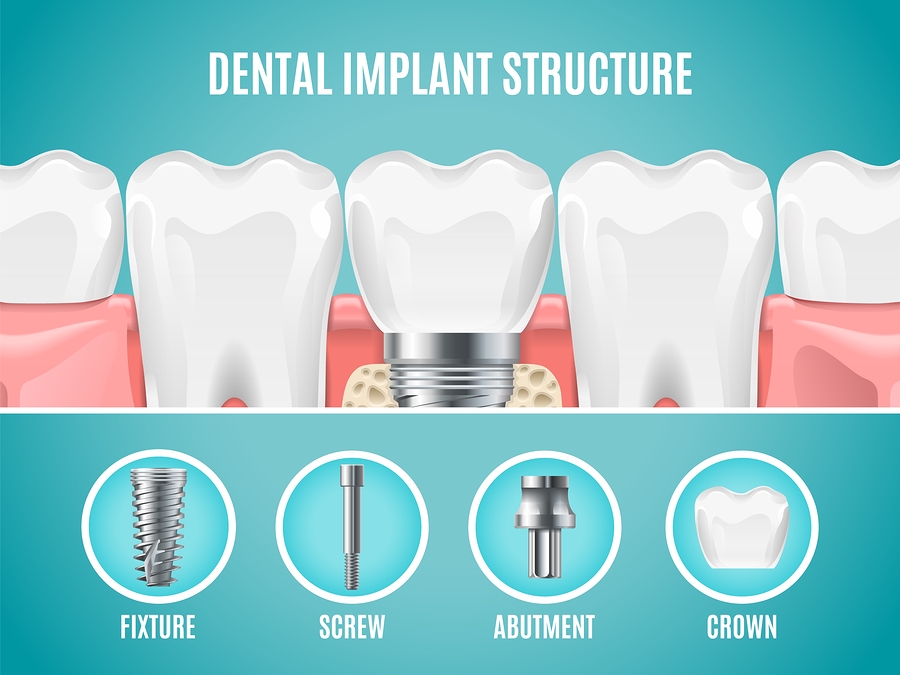How Dental Sense can Save You Time, Stress, and Money.
Table of ContentsFascination About Dental SenseSome Known Facts About Dental Sense.The Single Strategy To Use For Dental SenseFascination About Dental Sense
are clinical devices operatively dental implanted into the jaw to bring back a person's capacity to eat or their appearance. They provide support for man-made (phony) teeth, such as crowns, bridges, or dentures. When a tooth is shed as a result of injury or illness, a person can experience difficulties such as fast bone loss, defective speech, or adjustments to eating patterns that cause pain.Dental implant systems consist of an oral implant body and oral implant abutment and may also include an abutment addiction screw. Same day dental implants. The oral implant body is operatively put in the jawbone in place of the tooth's origin. The dental implant joint is generally connected to the implant body by the joint fixation screw and expands via gums right into the mouth to support the affixed artificial teeth
(https://www.tripadvisor.in/Profile/dentalsense1)Structure of The Dental Implant System selecting dental implants, talk to your oral provider concerning the potential benefits and dangers, and whether you are a prospect for the treatment. Things to take into consideration: Your general health is a vital factor in determining whether you are a good candidate for dental implants, exactly how long it will take to recover, and how much time the dental implant might remain in place.
Smoking may impact the recovery procedure and reduce the long-lasting success of the implant. The recovery procedure for the dental implant body might take a number of months or longer, throughout which time you commonly have a short-term abutment in place of the tooth. the oral implant treatment: Carefully adhere to the dental health instructions provided to you by your oral provider.
Some Known Incorrect Statements About Dental Sense
Implant failure can cause the requirement for an additional surgery to take care of or replace the implant system. Brings back the ability to eat Brings back cosmetic appearance Assists maintain the jawbone from shrinking because of bone loss Maintains the wellness of the bordering bone and gum tissues Aids keep nearby (close-by) teeth steady Boosts quality of life Damages to bordering all-natural teeth throughout dental implant positioning Injury to the surrounding tissues throughout surgical procedure, such as sinus opening Injury throughout surgical procedure (for instance, crack of surrounding jawbone) Insufficient feature, such as feeling like the teeth do not attack with each other generally A sensation that the tooth is loose or turning in location resulting from an abutment screw loosening Implant body failure (looseness of the implant body) due to systemic infection, which may be more probable in patients with unrestrained diabetes mellitus as a result of neighborhood infection in bone and periodontals supporting the dental implant body as a result of delayed healing, which may be extra most likely in individuals who smoke Problem cleaning the gums around the dental implant, leading to inadequate oral health Unattended gum condition Post-surgical numbness because of nerve impingement or damage Always notify healthcare carriers and imaging specialists that you have oral implants prior to any kind of magnetic resonance imaging (MRI) or x-ray treatments.
FDA is not knowledgeable about any kind of adverse events reported for MRI or x-ray procedures with oral implants. Dental implants systems are commonly made of materials that comply with worldwide consensus criteria of the International Organization for Standardization (ISO) or ASTM International. These requirements have details of what makes a risk-free product.

An oral implant is a framework that replaces a missing tooth. With screw-like tools, the doctor inserts an implant right into the jawbone, and it acts as a support for a fabricated tooth, called a crown.
A Biased View of Dental Sense
Some individuals are not qualified for oral implant surgery. It is for dental surgeons to operate individuals with: severe illnessuncontrollable metabolic diseasebone or soft cells condition or infectionIf these concerns are dealt with, a person can have the surgical procedure. In, dental cosmetic surgeons avoid from operating individuals with: If individuals with any one of the above undertake dental implant surgical procedure, there is a greater risk of the dental implant stopping working.

Oral dental implant surgical treatment is an individualized procedure. Provide you time to heal. Attach the message and last crown, bridge or denture.
Next, your cosmetic surgeon will very carefully put the dental implant into your jaw. Ultimately, your specialist will certainly rearrange your periodontals and close the laceration with stitches. If your implant is near the front of your mouth, your dental practitioner will make a short-term tooth for you to wear up until you heal. That means, you will not have a space in your smile while you recover.
The 5-Second Trick For Dental Sense
Your company can tell you what to expect in your scenario. During the healing phase, your jawbone must fuse to the oral implant. This process, called osseointegration, is crucial for security and long-term success. This procedure can take anywhere from three to 9 months. In some cases, it might take longer.
Once your dental implant heals, your dental expert can attach the joint (little adapter post) and your final restoration (crown, bridge or denture). This typically takes regarding one hour to complete and might need a second minor surgical procedure. You should not feel any type of pain throughout your dental implant treatment since your company will certainly utilize medicine to numb your periodontals.